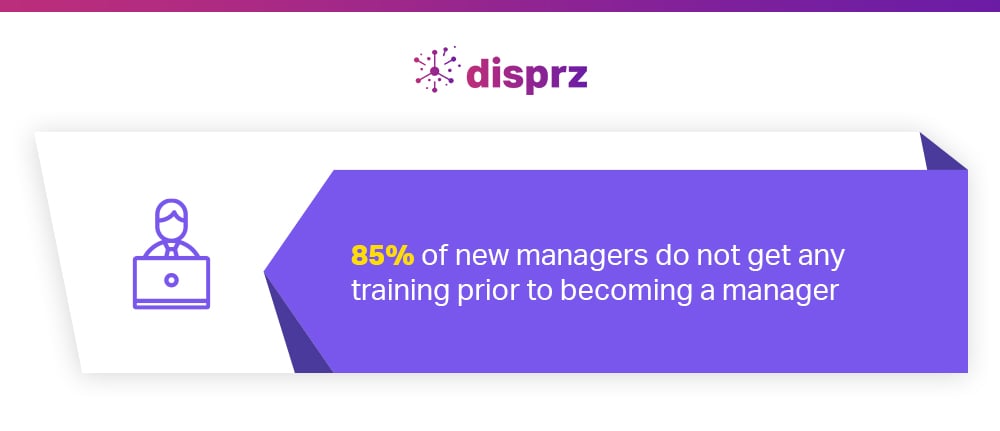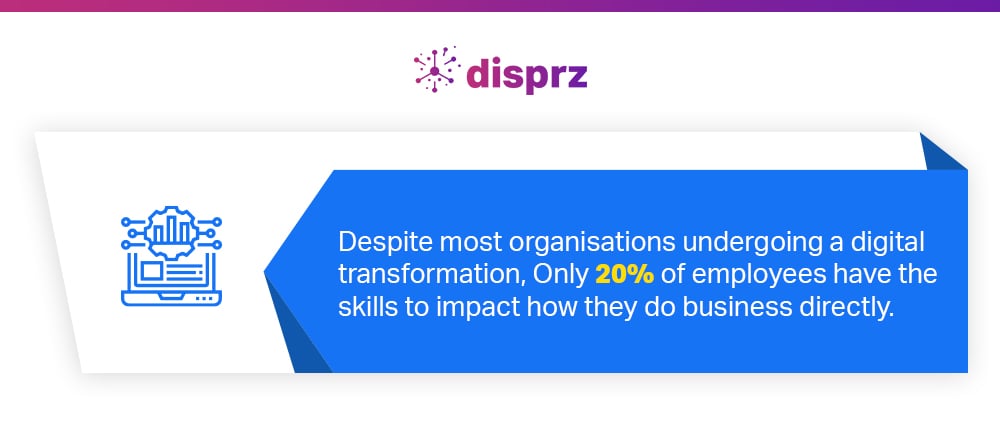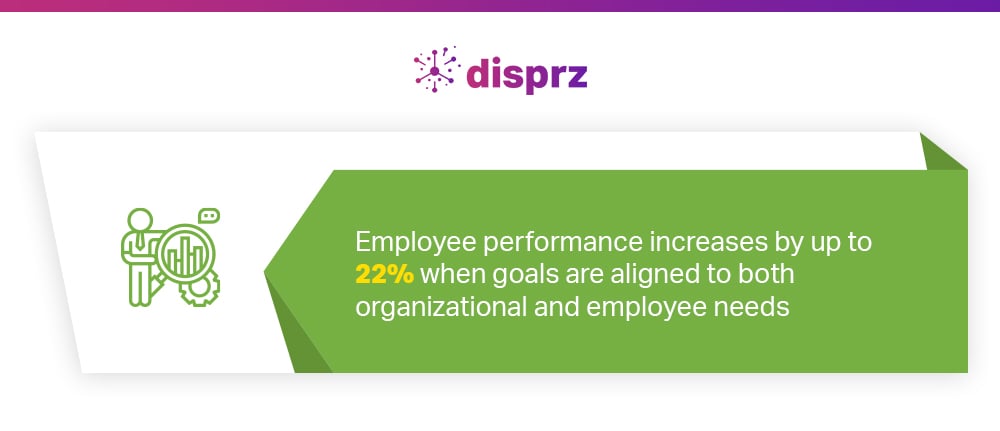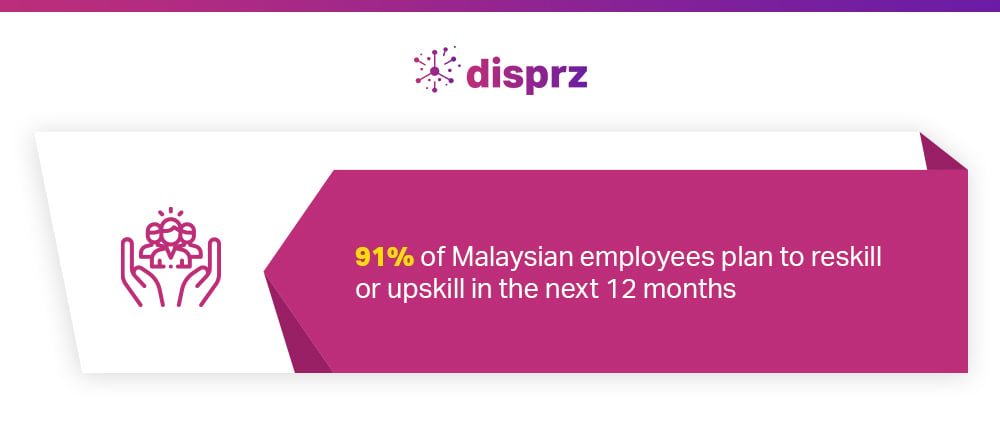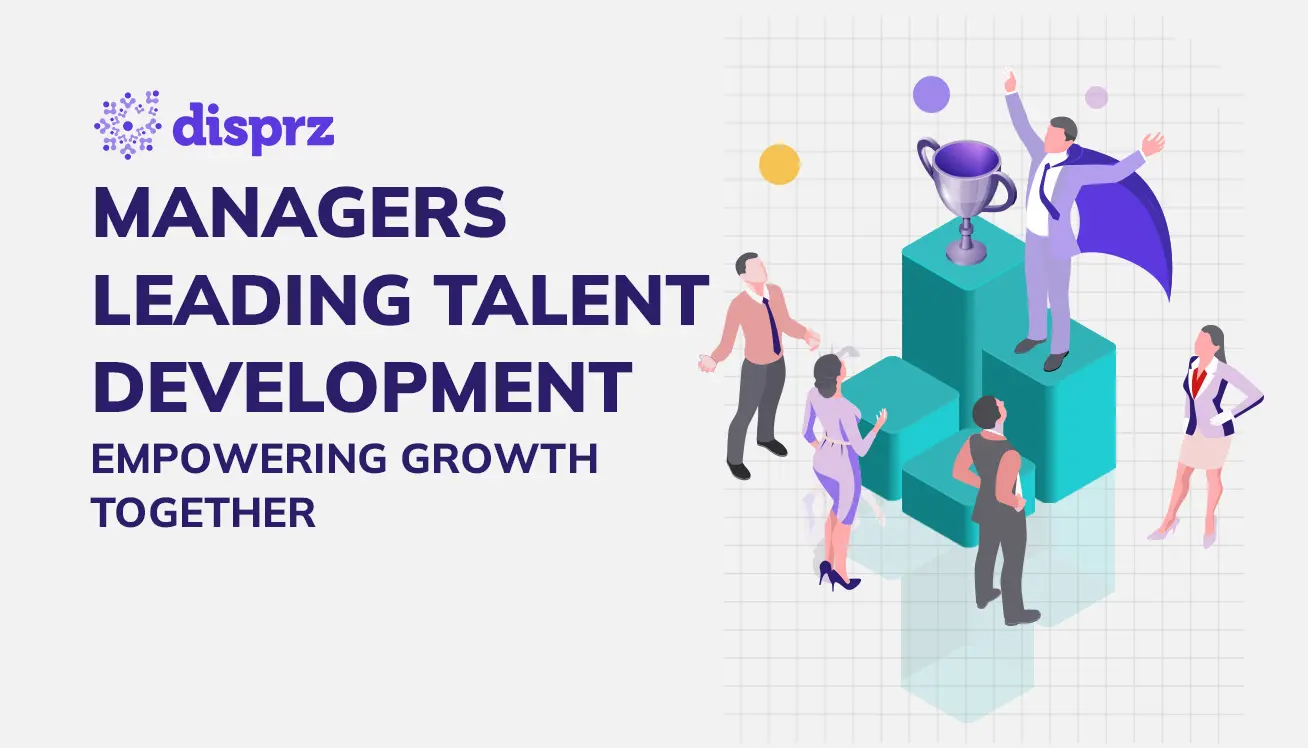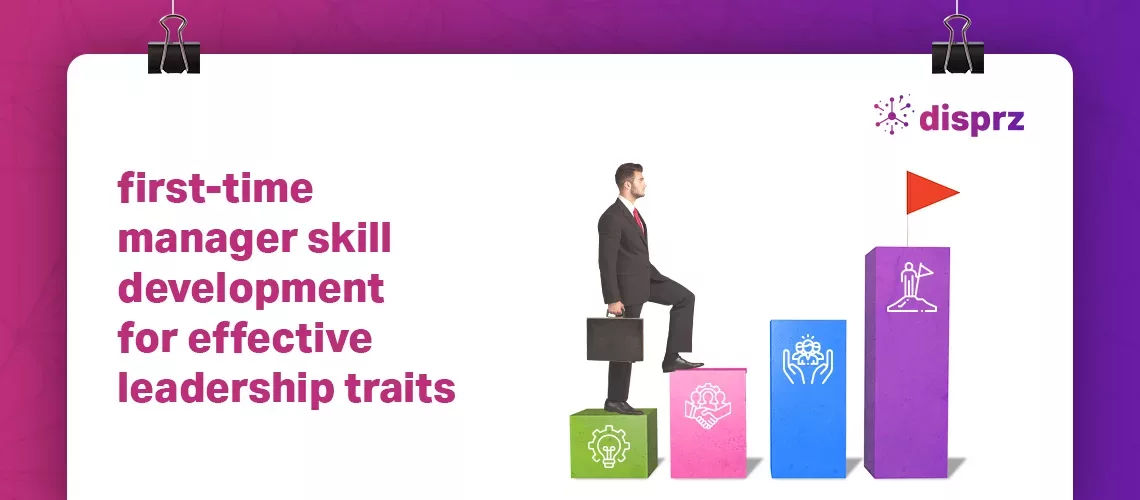
6 min read
• 15 May 2024
Targeted On-The-Job Skill Development For First-Time Managers
Manager training is crucial to streamline their process and ensure that they are equipped with the skills aligned with business needs. Read more!
-
eBookEmployee Upskilling - A Detailed Blueprint For Building A Skills-Driven Learning Culture
Being a first-time manager can be pretty intimidating when managing a team. Several new managers don’t know where to begin as there isn’t a set approach to leadership. You can equip the employee with the necessary skills with targeted on-the-job manager training as this position has a learning curve.
According to recent research, 20% of first-time managers are doing a poor job.
A manager has several responsibilities, like focusing on team growth, task delegation, time management, and more. The best fit for the role of a manager is the person who can strategically incorporate employee strength to meet organizational goals. Good managers need soft skills, emotional intelligence, team management, etc.
Challenges new managers face
A new manager has a lot on his plate by juggling several sets of responsibilities. It’s no wonder they often feel overwhelmed with these new responsibilities and everything that comes with them.
There are three primary skills that new managers need to gain or have a clear picture of what new managers need to start on the right foot.
Creating a leader mindset
Adopting a leadership mindset is a critical mental shift that all new managers must make to succeed in their new roles. It isn’t just a promotion but a career change because your role changes from being an individual contributor to managing a team. So, as a new manager, you need to learn a lot.
The primary aspect of improving mindset in first-time managers is to avoid a fixed mindset where they believe that a person can’t improve or change. Such a thought process can adversely affect the ability of a first-time manager to grow and develop as it impacts how you manage your team members.
Leadership training for new managers helps create a leader mindset to build a productive environment for gaining the necessary skills.
There are abundant opportunities for you to learn and grow in the new role with continuous feedback from management, helpful peer feedback on similar situations, and a fellow manager’s experience. It’s best to have an open mind for opportunities to learn new things and focus on efforts with helpful feedback.
Lacking Proper Training And Resources
Employers play a crucial role in equipping their staff for success in new roles and fostering their leadership development. This includes facilitating access to mentors with relevant experience who can offer guidance and support tailored to the challenges of the role. Additionally, employers should offer training on essential skills such as communication and team management, empowering employees to navigate through their responsibilities effectively and lead with confidence. By investing in their staff's growth and providing the necessary resources and training, employers not only enhance individual performance but also cultivate a culture of continuous learning and development within the organization.
Bridging skill gaps
Identifying & bridging skill gaps are a crucial part of leadership skills for new managers. Recognizing employees who need development can help enhance contribution to the team’s growth and productivity.
Continuous interaction with the team members can help the first-time manager understand the strengths and weaknesses of their teammates. They can leverage the learning experience platform (LXP) to identify the necessary skills and create an effective learning journey for their team members to help them bridge the gap and improve their performance.
Did you know that more than 40% of Singapore workers resign from their jobs because there’s a lack of skills training? Managers can encourage employees to continue growing as professionals by reinforcing their development with feedback and praise.
Managers can use a blend of private and public recognition, which includes:
-
Acknowledging employee development in the team meeting
-
Communicate employee growth to the company leadership
-
Interact to know what the employees have learned
-
Motivate the employee to share their findings after their research
Set performance goals
Establishing performance goals is decisive for first-time managers as it can help them grow as leaders and develop realistic goals for the team members. Everyone has different performance levels, and you can streamline the entire process through regular goal-setting sessions with your team.
How exactly is setting performance goals vital for organizational growth? New managers must understand that setting performance objectives helps engage employees.s. It doesn’t imply that the team is just imitating the activities but is more productive when engaged by getting more work done in a day, which is of a higher value.
There are several distinct strategies that managers can use to set performance goals for themselves and their team. Specific, Measurable, Attainable, Relevant, and Time-Bound are one of the most popular ways to set objectives. Objectives and Key Results Methodology is another leading method to keep teams accountable.
But with so many responsibilities, how can managers handle this additional responsibility to track the progress of those they supervise? An LXP can help you set performance goals by giving access to in-depth analytics and a quantitative assessment of your & your team’s competency.
Goals for first-time managers for the first 30, 60, and 90 days
Setting goals in your new managerial role is crucial for a smooth transition and ongoing success. Here are examples for your first 30, 60, and 90 days:
30 days: In the first month as a manager, delve your employees into understanding the company's mission and values. Foster effective relationships with employees, discern management duties from delegated tasks, and clearly outline expectations to enhance leadership development and team synergy.
60 days: After one month, grasp each employee's work style and management needs. In the second month, solicit anonymous feedback, schedule weekly meetings to foster goal alignment, and evaluate department practices for necessary improvements or technology updates.
90 days: By the third month, new managers usually feel confident in their leadership. They can further their success by conducting employee assessments, adapting management styles based on feedback, and setting long-term departmental goals.
7 Tips for first-time managers to hit the ground running
1. Embrace a Growth Mindset
Continuously strive for improvement to become invaluable in your role as a manager.
2. Master Delegation
Recognize tasks best suited for your team, delegating efficiently to maximize productivity.
3. Understand Individual Motivations
Cultivate strong relationships with your team, aligning tasks with their interests and motivations for optimal performance.
4. Hone Active Listening Skills
Demonstrate attentiveness and respect during discussions, fostering open communication and trust.
5. Establish Clear Expectations
Articulate goals and measures for success, ensuring clarity and alignment within the team.
6. Prioritize Outcomes
Focus on results rather than micromanaging processes, embracing diverse working styles.
7. Create Psychological Safety
Encourage open dialogue and respect for boundaries, allowing all team members to contribute fully.
How can L&D teams help with the on-the-job skill development of new managers?
A manager supervises people, products, services, engagement, etc., and is a critical cog in the mechanism of every business. Strong managers guarantee work is completed on time and promote retention, productivity, and growth.
L&D teams can offer skills training for new managers to develop their latent leader skills by making it easier to manage the team. With new manager training, it exhibits that not only the manager but the organization is interested in their growth and contributions.
Daily training = Daily ritual
Structured and daily manager training is critical to business outcomes. It clearly outlines the learning schedule, assignment of responsibilities, time frames, and activity outlines. This structured training program leads to employee development.
Daily learning allows managers to turn knowledge into action. New managers struggle to balance their tasks with the new responsibilities. Accessible mobile-led learning fits their busy schedule for on-demand new manager training.
New manager training includes soft skill development on communication and leadership skills which fast tracks them to the path to success. Leadership development is efficient for skills training for new managers as it ensures that they share the vision of the company and practices with employees with on-the-job training.
Scalable skilling with time to productivity
About 62% are semi-skilled, and 14.5 % are low-skilled out of the 97% of Malaysian full-time employees. Managers can’t only benefit from implementing the skilling cycle in full swing but also encourage their employees to develop their skills.
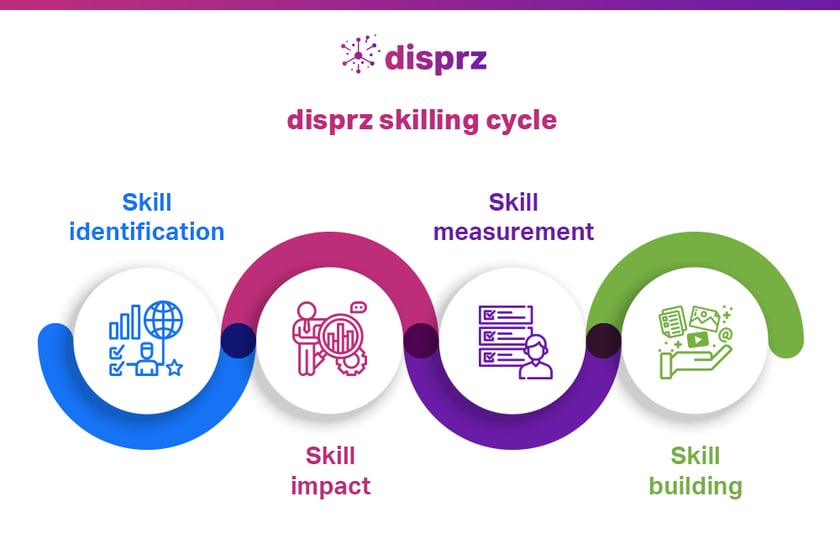
The skilling cycle is divided into four significant steps: skill identification, skill assessment, skill building, and skill impact. Managers can identify role-based skills to address every skill requirement of the team benchmarked against the top industry skills. Skill assessment is a beneficial tool to get actionable insights on the current readiness, and skill building helps bridge gaps with strategic objectives to gain a competitive advantage.
You can complete the skilling cycle with skill impact by tracking their & employee progress with proficiency improvement. L&D teams can add these steps to the skills training for new managers and provide them with a learning experience platform to run the entire process seamlessly.
Personalised learning
A personalized learning experience is critical in new manager training and engages them at every level to recognise potential barriers. Blended personalized learning training approach to focus on the needs of learners.
For instance, several new managers in your organisation have busy work schedules while collaborating with other team members. It becomes essential to create a targeted program and help bridge these barriers that will maximise the personalized learning’s efficiency and return on investment (ROI).
Personalized content and experiences motivate employees to skill up to perform better in their roles and enhance their abilities in the future. It further assists in driving engagement and strengthening the upskilling efforts. It isn’t just another item on the to-do list but an opportunity for you, your team, and the organisation to excel by unleashing the hidden potential.
Impact of social learning
Companies are looking for ways to make continuous learning and training part of an employee’s professional journey. Social learning is pivotal in creating a culture of continuous new manager training.
More than 60% of organisations need their employees to communicate daily or weekly with learning resources, and 73% of organizations will focus on social learning, as per the Brandon Hall report. New managers can spend minimal time on learning without disrupting their flow of work with social learning.
It fosters workplace collaboration and improves corporate culture. We, humans, are social beings, and through this method, employees can support each other to be part of something big and motivate other employees and team members to pursue learning.
How can a learning experience platform help with manager training?
Managers are a necessary component of the company structure and the building blocks to connect the managing director tactically with the employees. A bad manager can adversely impact employee turnover, productivity, job satisfaction, and company culture.
A learning experience platform (LXP) helps align key business objectives with manager training. Disprz LXP platform trains managers on the skills required for their role and strategically utilises the strengths & weaknesses of each employee to create a successful organisation.
Our AI-powered learning platform leans more towards the autonomous learning style that supports a wide range of content sources like industry articles, blog posts, podcasts, videos, and courses. It empowers users to create & publish content, including user bios, activities, and achievements. Disprz skilling cycle helps you address all the aspects by discovering the right skills, conducting periodic assessments & feedback, building skills, and getting profound insights on real-time progress.
Disprz LXP is crucial to businesses as it addresses the skilling needs of new managers with peer-based social learning and personalised learning. Further manager training directly impacts the business bottom line by reducing employee attrition, increasing employee productivity, revitalising teams for a shared sense of purpose, and more.
Empower your employees on the path to success!
About the author

Debashree Patnaik
Debashree is a seasoned content strategist at Disprz.ai, specializing in enterprise learning and skilling. With diverse experience in B2B and B2C sectors, including ed tech, she leads the creation of our Purple papers, driving thought leadership. Her focus on generative AI, skilling, and learning reflects her commitment to innovation. With over 6 years of content management expertise, Debashree holds a degree in Aeronautical Engineering and seamlessly combines technical knowledge with compelling storytelling to inspire change and drive engagement.
More Resources
Sign up to get free resources and stay up to date with Disprz!
Discover how Disprz can align learning and upskilling with your desired business outcomes.



